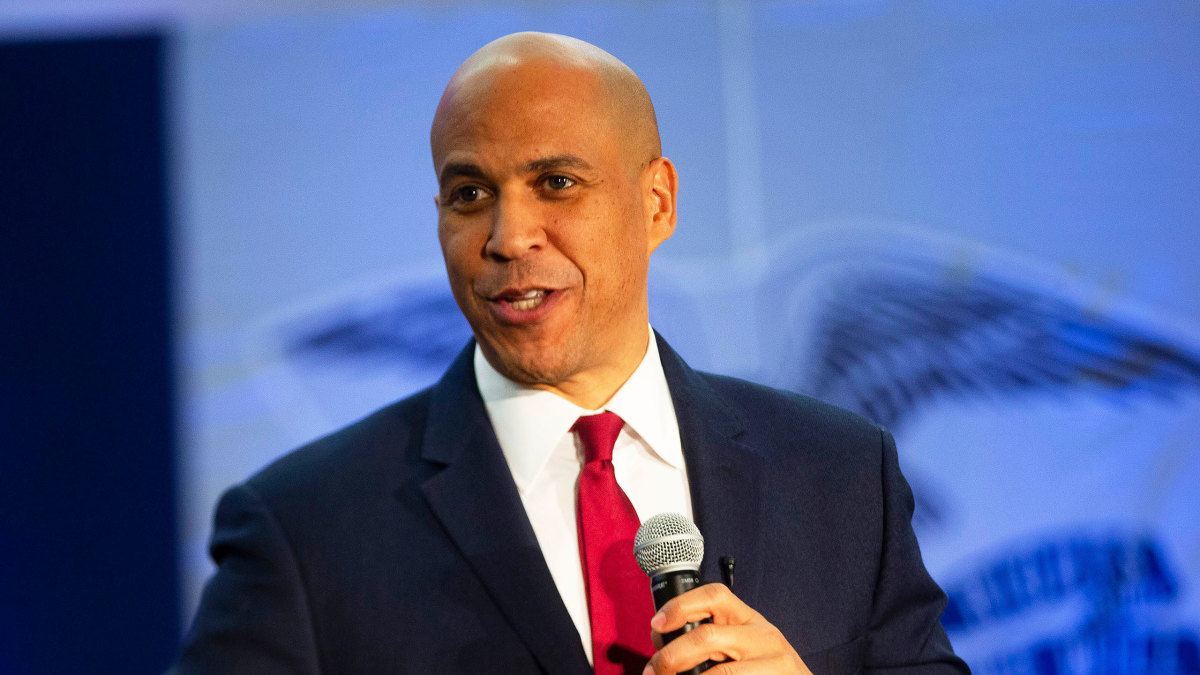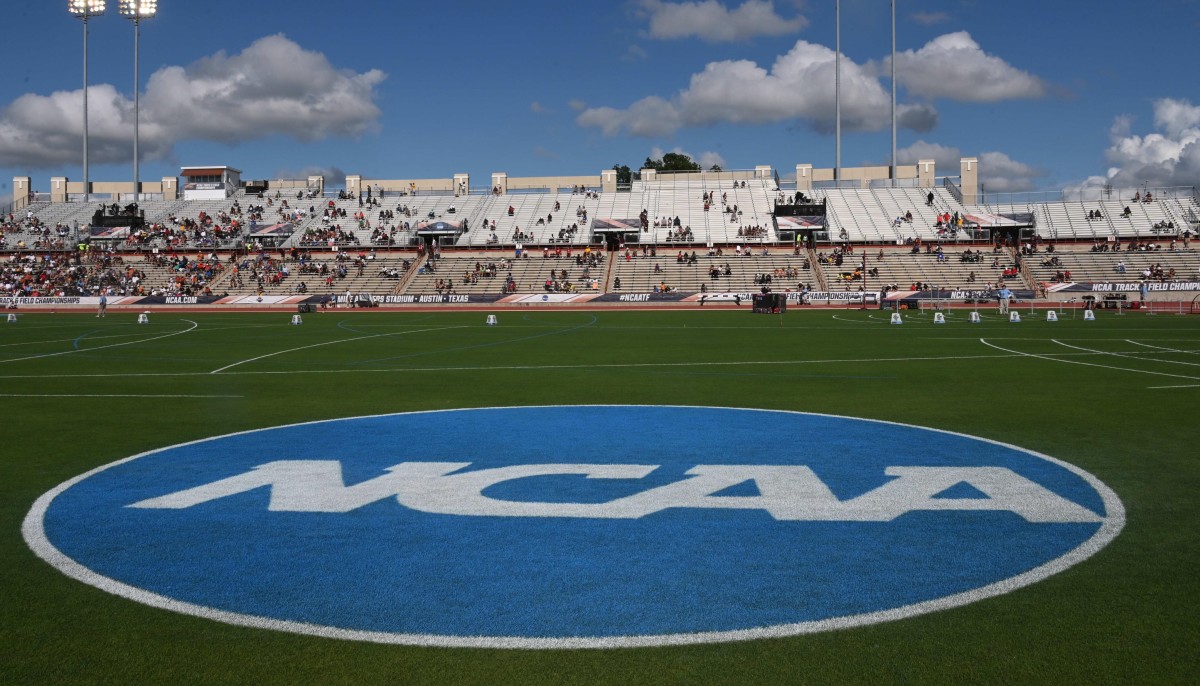Inside the Landmark College Athletes Bill of Rights Being Introduced in Congress

Cory Booker may be a current U.S. senator, ex-mayor and former presidential candidate, but he’s also a college football fan.
And just like many college football fans, he wants to see the return of the NCAA Football video game. In fact, his friends keep bugging him about it.
“You say it’s trivial, but it ain’t,” Booker, a former tight end at Stanford, says. “You’re hitting in my own world.”
The most recent legislation that Booker (D-N.J.) plans to introduce in Congress is an ambitious and sweeping bill that could change college athletics forever—as well as open the door for the return of NCAA Football, the Electronic Arts college game that mesmerized gamers until legal disputes over its use of player likeness suspended production in 2014.

Booker’s College Athletes Bill of Rights guarantees NCAA players monetary compensation, long-term health care, lifetime educational scholarships and even revenue sharing. It would virtually dissolve national letters of intent, bar coaches and administrators from influencing an athlete’s academic decisions, and create a medical trust fund.
But for all of these groundbreaking concepts, Booker knows that one will create more buzz than any other. By granting athletes permission to access group licensing, the legislation provides a pathway for the return of the video game. And though Booker’s gaming days are long behind him, he understands its significance.
In a world flourishing with electronic gaming competition, an entire generation is unfamiliar with NCAA Football.
“You and I both know that college athletics and college football is an important part of our culture,” he says. “People do want these things back. I have a lot of friends that really want to see it come back. They also know that, when playing, they want to have that feeling that comes with knowing athletes are actually benefiting from it.”
Long talked about and now official, the College Athletes Bill of Rights will be introduced this week and, for now, includes co-sponsors Sen. Richard Blumenthal (D-Conn.), Rep. Janice Schakowsky (D-Ill.) and Sen. Kirsten Gillibrand (D-N.Y.).
“The provisions in this bill are ambitious and consequential but also practical,” Blumenthal says. “These are ideas whose time has come. This bill has real teeth. We are talking trash, we are taking the field.”
The bill of rights is the latest piece of legislation on Capitol Hill regarding college athletics.
While juggling pandemic and fiscal duties, lawmakers have engrossed themselves in the world of college sports since December 2019, when NCAA leaders first pleaded for their help with name, image and likeness. At first thought of as a bipartisan issue, sides are quickly forming, and the gulf between conservatives and liberals continues to widen; there’s no greater example than Booker’s latest bill.
While Republicans are introducing bills that are limited to only name, image and likeness, Democrats are firing back with more broad legislation that is sure to rankle NCAA headquarters. The compromise is likely somewhere in the middle—not limited to NIL but also not as extensive as Booker’s proposal.
The bill of rights expands on NIL greatly.
It not only grants athletes the right to earn NIL compensation, but also requires schools to share 50% of their profit with athletes from revenue-generating sports, after accounting for cost of scholarships. Sharing revenue with athletes is one of the most aggressive proposals in the bill, a move that the NCAA and its members firmly stand against and something that will in all likelihood create Republican rebuke.
Booker’s legislation also calls on the Departments of Health and Human Services (HHS) along with the Centers for Disease Control and Prevention (CDC) to develop health standards for college athletics, with specifics for concussions, traumatic brain injuries and sexual assault.
The bill requires athletes to receive a scholarship for as many years as it takes for them to receive an undergraduate degree, and it also bans coaches and administrators from influencing or retaliating against a college athlete for their choice of academic major or course.
A medical trust fund would be created for athletes to use to cover the costs of any out-of-pocket medical expenses while in college and for five years after their eligibility expires, if used to treat a sport-related injury.
And finally, the bill would lift all restrictions and penalties that prevent athletes from attending the school of their choice, including transfer penalties and those tied to national letters of intent, documents that when signed bind a player to a certain school. In January, the NCAA is expected to eliminate the one-year sit-out penalty required of an athlete transferring from one Division I school to another. In the latest version of the proposal, an athlete can transfer once without penalty.
Booker believes athletes should be able to transfer an unlimited amount.
“The system is broken right now. I’m sure that only once is not fair,” says Booker. “I have grown dissatisfied with the NCAA’s talk of a lot of reforms and their failure to implement them. They’ve failed to police themselves and protect athletes as they should.”

Booker’s bill will face harsh criticism, from both NCAA leaders and Republicans. The legislation, for now, is not bipartisan in nature, but Booker is confident there is enough agreement on this issue in the U.S. Senate for compromise.
“I haven't talked to a senator yet that is not sympathetic to these issues,” he says.
Still, it may be an uphill battle. And there’s a deadline involved, too. The NCAA is encouraging Congress to adopt a bill governing NIL by the summer, when Florida’s own state NIL law takes effect, giving Florida schools a different set of rules to play by. The NCAA, meanwhile, is hurriedly crafting its own legislation that it expects to pass officially in January.
A federal bill from Congress would likely make both the NCAA’s and the state’s NIL legislation moot.
Last week, one of the most powerful members of the U.S. Senate introduced a bill narrowly focused on NIL. Senator Roger Wicker’s proposed legislation is expected to begin moving through the Commerce Committee in the next Congress in January. While Wicker’s bill allows athletes the right to earn NIL compensation, it grants the NCAA antitrust protections, preempts state NIL laws and creates a path for schools to restrict certain NIL endeavors—all potential sticking points with Democrats, who control the House, will soon command the White House and may even take back the Senate, if they win the two runoff elections in Georgia. That would likely result in any NIL legislation to be expansive in nature.
Meanwhile, there is new hope that the NCAA Football video game could soon make a return. The group licensing concept in Booker’s bill could be part of a compromise in overall NIL legislation.
“There may well be compromises in the next Congress,” Blumenthal says. “This bill enables us to come out of the gate running.”
Many industry experts were shocked earlier this year when the NCAA’s NIL proposal did not include group licensing, which is an easy way for hundreds of college athletes to get a slice of the money pie through sales of apparel, memorabilia and, of course, video games.
Group licensing, historically a professional sports concept, is unworkable in college athletics without unionization, the NCAA has contended. However, during an exploration of the topic by Sports Illustrated in May, many experts disagreed with that notion.
In fact, many expected the NCAA’s first step into the NIL world to include group licensing and maybe nothing else, allowing athletes incremental payments across the board as opposed to solitary income opportunities for events such as autograph signings, televisions commercials and social media ads. The report instead revealed the opposite.
The result, some believe, will have star players with large social media followings making six and maybe even seven figures a year while others struggle to break into five digits. Jim Cavale is the CEO of INFLCR, a software platform used by more than 100 college programs that allows teams “to store, track, and deliver content to their athletes, coaches, alumni, and other brand ambassadors.” An athlete with a combined 150,000 followers on their social media platforms could stand to make “well into the six figures,” Cavale said in the spring. The face of college football in 2020, Clemson quarterback Trevor Lawrence, has about 500,000 followers on Instagram alone.
Group licensing would open the door to the overlooked player, still part of a football team’s success but without the branding, name recognition or gaudy stats of a Lawrence.
It’d be a win-win for both players and fans. Athletes get money in their pocket and fans get access to purchase jerseys with their favorite player’s name on the back. Oh, and there’s that video game too.
As a Stanford alum, Booker imagines himself electronically operating Stanford’s offense with, this time, the player names on the screen. Or maybe he won’t play at all. He remembers the last time he popped in NCAA Football with friends.
“I was thoroughly spanked,” he laughs. “I definitely have played and I have thoroughly gotten spanked by the people I know.”
